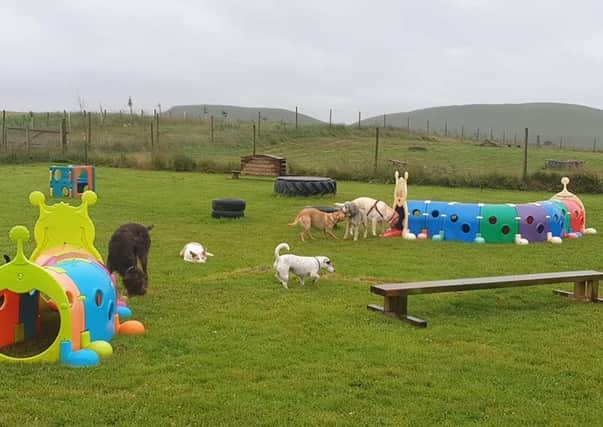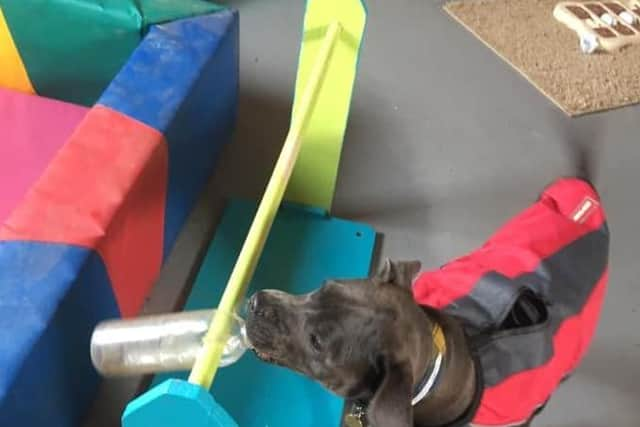Our dogs may be struggling to cope with Covid-19 just as much as we are


Covid-19 is something that few of us were aware of at the start of the year, but it has since taken over almost every aspect of our lives.
We have had to alter how we work, shop, travel, socialise, and also how we care for our pets.
Advertisement
Hide AdAdvertisement
Hide AdWhen we were all in lockdown, it was a scary time, however our pets were there to comfort and support us.


Whereas before we went out to work and they were used to us not being there, suddenly we were with them 24/7.
We had time to sit with them, play their favourite games and walk them during the allowed time restraints for daily exercise, getting us out of the house for some much-needed fresh air.
Initially, our pets must have been delighted with this change.
Advertisement
Hide AdAdvertisement
Hide AdCats are pretty good at looking after themselves and are mainly solitary animals, but dogs are not.


They need to be part of a social group.
As people had a lot of free time, the trade in puppies boomed, and prices soared.
In theory, having a puppy when you are at home with lots of free time, makes perfect sense. The downside to lockdown, however, meant that people were not able to freely take their puppy outside during the critical socialisation period that puppies go through (roughly between the ages of five to 16 weeks old depending on the breed/individual).
What a puppy experiences during this period is critical to how they will develop as adults and there are a lot of adolescent dogs who are now struggling with life – scared of anything other than their safe home environment.
It isn’t just puppies who are struggling, however.
Advertisement
Hide AdAdvertisement
Hide AdAdult dogs who were used to their people leaving the home for a few hours every day now had them around all the time. To some, this was their ideal scenario, however, for a lot of dogs this meant a complete change of routine.
Normally they were left alone to sleep when their family were out at school and work, but now sleep is being disrupted (adult dogs need on average between 12 and 16 hours sleep a day) which in turn can affect their health and can cause behavioural changes.
Also, on the flip side, a lot of dogs whose owners were able to return to work are now suffering from separation distress.
Many dogs have been abandoned or given up to rescue homes during the pandemic, some through understandable financial hardship, but others because the dog has developed unwanted behaviours such as toileting in the wrong place, a change in behaviour towards other dogs or people (or any other stimulus that may trigger a fear/anxious response), has started digging holes in the garden, or chewing shoes, or has become quiet and lethargic.
Advertisement
Hide AdAdvertisement
Hide AdMental health issues, such as low mood and even depression also affects dogs, just as it does humans.
So how can we now support our pets, who helped us during the very scary start of the Covid-19 pandemic?
Dogs thrive on predictability and routine. Even if people are working from home, try to set up some sort of routine so that your dog gets some time alone (to sleep, be calm and settled).
Humans sense the world via our eyes and ears, however, dogs primarily interpret the world through smell – dogs’ have, on average, 220million scent receptors, compared to humans who have around 5-6million.
Advertisement
Hide AdAdvertisement
Hide AdSeeing the world through the dogs’ perspective is very important.
If we are anxious or stressed, we release hormones that dogs pick up on – making it more likely for them to be anxious and stressed too.
Giving our pets positive opportunities to use their sense of smell can help calm them and can improve mood as searching for food, for example, releases Dopamine, a feel-good hormone.
An easy activity to do for your dogs within the home, or garden is free work, where a variety of different objects, textures (such as small carpet squares, scrunched up paper, etc), cardboard boxes, toilet rolls and slow release treat toys are laid out within a small area with tiny treats hidden near and under the objects.
Advertisement
Hide AdAdvertisement
Hide AdYour dog will love being able to sniff and explore on his/her own. It helps provides your dog with a calming experience which engages their “seeking” system – a scientifically-proven emotional response based on the dogs’ basic survival instinct.
This allows your dog to calm down if it is over aroused, or anxious, improves posture and helps build confidence.
Most importantly, it improves the bond we have with our dogs as we interact with them during their exploration of the area. Free work should always be a supervised activity.
Other ways for dogs to feel more confident, and independent, is for them to go out with an experienced dog walker, or for them to attend a well-run dog day care centre.
Advertisement
Hide AdAdvertisement
Hide AdDoggy daycare isn’t right for every dog and it is important that daycares have fully trained and experienced staff who will properly supervise them, and introduce them to other dogs slowly, and on their terms.
This is particularly relevant and important for those dogs and puppies who have struggled under the COVID restrictions. If a puppy, or under-socialised adult dog, is just put into a group of more confident, playful dogs, this could make their behaviour much worse, not better.
At TweedDogs we consider a dogs’ mental health as important as their physical health and we have a variety of activities for dogs to do.
We have an area dedicated to Caroline Euman, a special person who loved dogs, and animals in general. Caroline’s Corner is a fabulous area within our centre where dogs can experience free work on a one-to-one basis.
Advertisement
Hide AdAdvertisement
Hide AdThis is a super, calming experience for those dogs who are a little anxious or over aroused.
Having a stressed dog causes stress within a family, and rescue centres are seeing the results of this.
If a dog is really struggling and exhibiting behavioural issues, then contact a qualified behavioural consultant who can help work out the cause(s) of the dog’s behaviour and devise a modification plan to make the dog feel safe and happy ... and if our dogs feel safe and happy, then that usually makes us feel safe and happy too.